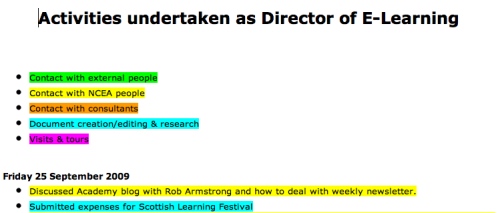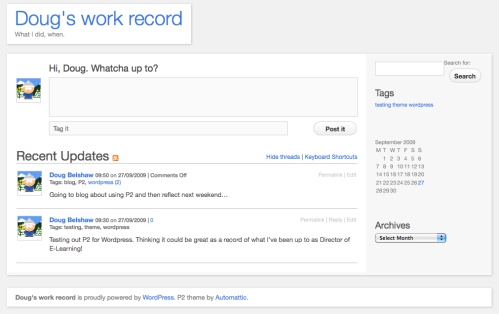Assessment in UK schools: a convenient hypocrisy?

There’s a couple of lines in the otherwise-average film In The Loop that not only made me laugh but made me think. At one point in the film, a British civil servant is remonstrating with his US counterpart. They end up in a very modern-looking chapel within a government building. The British civil servant starts shouting and swearing at which point the American reminds him that they’re in a sacred place, adding:
Neither of us believes that, but it’s a convenient hypocrisy.
I’ve realised that convenient hypocrisies happen often. Unfortunately, I believe it happens with assessment in UK schools every day. 🙁
Now I’m no expert on assessment, but even I know that research has established the following:
- Students regress as well as progress due to emotional, psychological, sociological (and other) factors.
- National curriculum levels and sub-levels are intended as summative, end of Key Stage assessments.
- Not all students progress at the same rate.
Yet, in all of the schools I’ve worked in during my teaching career, we’ve done the following:
- Used National Curriculum level descriptors on a half-termly (or even a weekly) basis.
- Set students targets based on the number of National Curriculum sub-levels an ‘average student’ will get through during a Key Stage.
- Make few allowances as to the reasons why students’ attainment might fluctuate.
- ‘Level’ as much work as possible when we know that doing so destroys any impact formative comments may have.
Using data systems based on numbers for assessment purposes looks impressive, gives control to senior leaders and produces pretty graphs and reports for parents. But is it useful to students? I’d argue that it’s not. Students become hung up on progressing through National Curriculum levels that aren’t always coherent and meaningful. It’s also very easy for Heads of Department to artificially inflate the National Curriculum levels of students whom they’d like to take their subject at GCSE. After all, if you’re a Year 9 student and you’re on a Level 6b in Geography and a 5c in History, which one are you going to take?
The reason for my inclusion of that particular Dilbert cartoon at the top of this post is that I reckon most UK teachers couldn’t differentiate between a Level 4b and 4a in their subject. In fact, the distinction’s pretty meaningless. I’ve seen some schools use the sub-levels as following:
- Level 4c – some work at Level 4 standard
- Level 4b – most work at Level 4 standard
- Level 4a – all work at Level 4 standard
In that case, why use the sub-levels in the first place? :-s
It’s my belief that Assessment for Learning, that buzz-phrase from a couple of years ago, has been hijacked and contorted into something it’s not. I’m certainly not arguing against students knowing where they’re at in a subject and how to improve. It’s just that using National Curriculum levels as a means for doing this smacks of laziness to me. Instead, professional teachers should be able to convey the key skills, processes and subject knowledge students need to be able to progress. That’s just good teaching.
If the above has left you feeling the need to brush up on your knowledge of assessment, you might want to read Beyond the Black Box and/or view the TeachersTV videos on the subject.
What are YOUR views on assessment? :-p

![Reblog this post [with Zemanta]](http://img.zemanta.com/reblog_e.png?x-id=75a147c5-bf6f-41cd-af44-99ba7b37a634)


![Reblog this post [with Zemanta]](http://img.zemanta.com/reblog_e.png?x-id=f84b56a0-03d0-4cce-b824-632c87b851ba)
